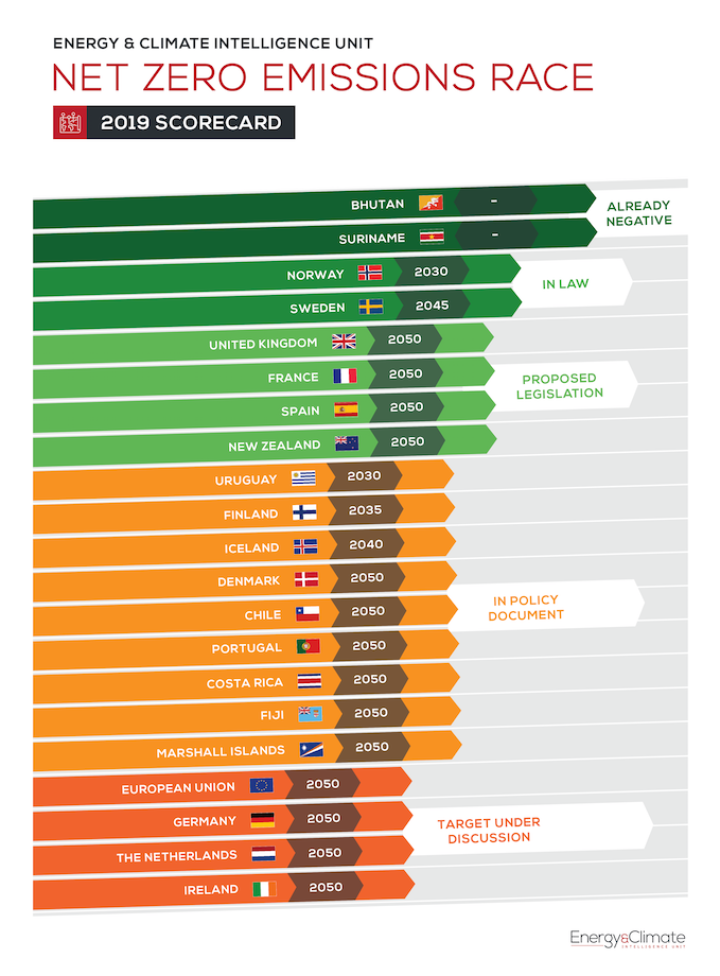One-sixth of global economy under net zero targets
New analysis by Energy and Climate Intelligence Unit (ECIU) highlights global progress towards net zero
By George Smeeton
info@eciu.netShare
Almost one-sixth (16%) of global GDP is now covered by net zero emissions targets set by nations, regions and cities, a new analysis by the Energy and Climate Intelligence Unit (ECIU) finds.

Fifteen nations have declared the intention of reaching net zero emissions in or before 2050. While most commitments come in policy documents, two countries (Norway and Sweden) have set the target in national legislation, with others set to follow. A further two (Bhutan and Suriname) already absorb more greenhouse gases than they emit to the atmosphere.
These nations are joined by at least 11 states and regions such as California, Catalunya and Scotland, and at least 23 cities including Barcelona, Los Angeles and New York.
“Having a net zero target with a date before mid-century is probably the best single indicator of whether a nation is serious about delivering what it promised at the Paris summit, so it’s notable that such a large slice of the global economy is already being conducted under net zero targets,” said Richard Black, Director of the Energy and Climate Intelligence Unit (ECIU).
“Of course a target means little without a process to meet it. But science shows unequivocally that halting climate change means reducing emissions to net zero; so if a government isn’t planning to bring its own emissions to net zero, it can’t really claim to be planning to do its share of stopping climate change.”
In December 2015, all governments pledged in the Paris Agreement to attempt to keep global warming to 1.5 degrees Celsius. In October 2018, the Intergovernmental Panel on Climate Change, the United Nations expert body, showed that in order to stand a reasonable chance of achieving this goal, governments need to bring carbon dioxide emissions to net zero by 2050.
“The fact that governments, regions, cities and businesses are beginning to set net zero targets indicates a growing level of concern among citizens and governments about climate change,” said Richard Black.
“It also reflects a growing body of evidence showing that it can be done, and done affordably.”
Last year, the Energy Transitions Commission, a global organisation including major businesses such as BP, Shell, Tata and Vattenfall, concluded that even sectors where decarbonisation is generally thought to be hard, such as aviation, shipping, steel and cement, could reach net zero by mid-century at a cost below 0.5% of global GDP.
The new ECIU analysis shows that at least 34 companies with annual income above $1bn have set net zero emissions targets – and a few have already met them.
The report also shows that more nations are due to set net zero targets, or to put existing targets in legislation, in the coming months. The UK will shortly become the largest economy with a legally-binding net zero target, having laid legislation before Parliament two weeks ago.
The UK is also a candidate to host COP26, the UN climate summit in December 2020 at which governments are due, under the Paris Agreement, to outline plans for cutting emissions more deeply, both in the near term and out to 2050. The report argues that the UK could advance this process my making the summit the ‘net zero COP’, involving civil society, academia, business and the finance sector in planning to expand the spread of net zero targets and methods of delivering net zero economies.
The report was launched on the sidelines of a UN climate meeting in Bonn, Germany, along with ECIU’s online Net Zero Tracker. The tracker collates and displays information on countries, regions, cities and states that have set net zero targets, and countries that are planning to do so. It will continuously be updated as more sign up.
To download the report, click here.